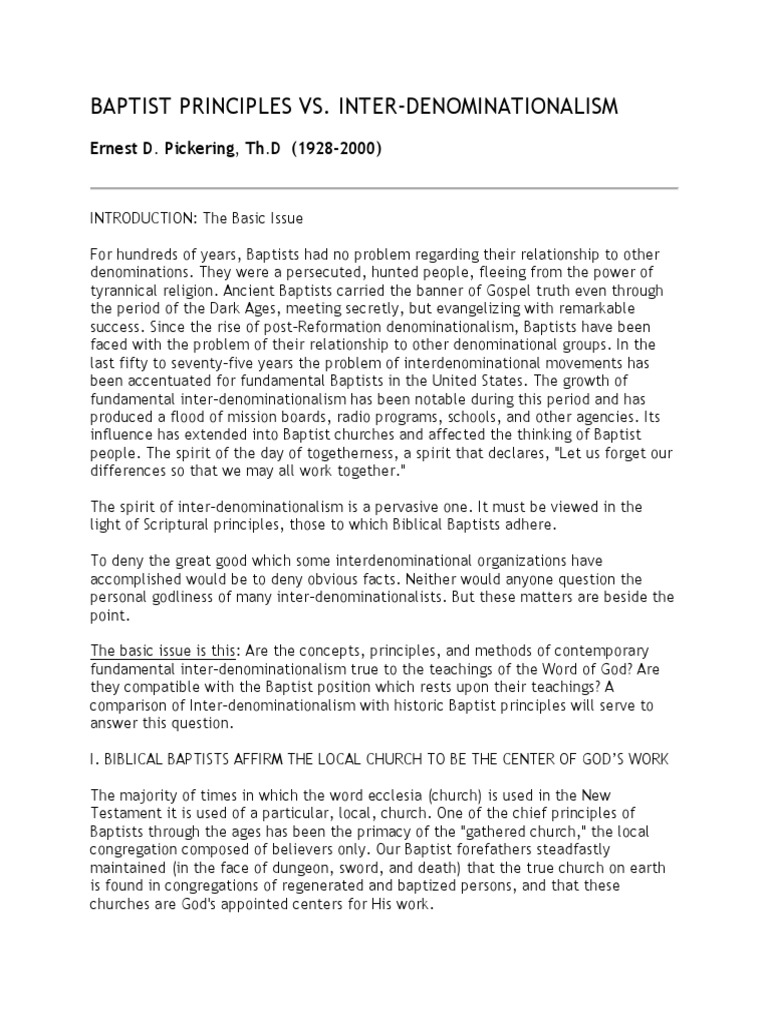The concept of a Baptist church stands as a remarkable edifice in the landscape of Christianity, representing a confluence of theological rigor, communal ethos, and a distinctive cultural heritage. To delve into the essence of a Baptist church is to embark on a journey through its theological underpinnings, traditions, and practices that uniquely denote its identity within the broader Christian family.
At the core of Baptist belief lies the doctrine of biblical authority, which serves as an indomitable foundation. The Bible is revered not merely as a historical text but as the divine word of God, encapsulating timeless truths. Baptists regard the Scriptures as the ultimate benchmark for faith and practice, breathing life into the ecclesiastical obligations that govern congregational life. This unwavering commitment manifests in their congregational polity, emphasizing local autonomy, where each congregation functions as an independent body under the lordship of Christ.
However, to understand a Baptist church is to appreciate its distinct practices surrounding baptism. The etymology of the term “Baptist” itself reflects a primary sacrament—baptism—administered by full immersion. This ritualistic act signifies not only an individual’s public declaration of faith but also embodies the theological conviction of believer’s baptism: only those who consciously profess faith in Jesus Christ should partake in the waters of baptism. This practice draws a stark line of demarcation, separating Baptists from traditions advocating infant baptism, thus amplifying the richness of individual faith journeys.
As one traverses through the sacred corridors of a Baptist church, the communal spirit is palpably alive. The ecclesiastical structure is often characterized by a congregational model, laying the framework for a participatory governance system. This participatory aspect engenders a profound sense of investment and accountability among members, allowing decisions—from budget allocations to pastoral leadership—to be made collectively. It is an embodiment of the mystical union of believers, often likened to a living organism, where each member contributes to the vibrancy of the whole.
Moreover, Baptist churches have historically asserted the principle of religious liberty. This commitment echoes through centuries, tracing its roots back to the Reformation era, where individuals sought respite from ecclesiastical overreach and persecution. The Baptist assertion of Soul Competency is paramount, advocating that each individual possesses the right to interpret Scriptures without mediators. This principle nurtures a culture of intellectual engagement, spurring theological inquiry and spiritual growth that is not confined by rigid dogma.
Another salient feature of Baptist churches is their emphasis on evangelism and missions, driven by the Great Commission. The theological premise that mandates believers to propagate the message of Christ is not a mere suggestion but a divine imperative. Missionary endeavors are thus woven into the fabric of a Baptist church, reflecting the belief that the gospel’s transformative power must be extended beyond the church doors, reaching the ends of the earth. This outward focus is akin to a lighthouse, guiding lost souls to the harbor of salvation.
The worship experience in a Baptist church is often marked by a simplicity that breathes authenticity into the liturgical components. Here, music plays a crucial role—whether through hymns steeped in rich theological narratives or contemporary worship that resonates with modern sensibilities. Each note reverberates, crafting a sonic tapestry that draws congregants into moments of transcendent communion with God. Prayer is intertwined with this worship, a dialogue that fosters intimacy and reflection, allowing the faithful to anchor their burdens and aspirations in divine grace.
The Baptist tradition is not monolithic; it exhibits a plurality that reflects a kaleidoscope of expression. From the Southern Baptist Convention to the American Baptist Churches, various branches delineate differing theological nuances and cultural expressions. Yet, this diversity does not obscure shared convictions; rather, it enriches the broader Baptist narrative. Therein lies a magnetic appeal: an ability to navigate differences while centering life on the core tenets of faith.
In the midst of evolving societal landscapes, contemporary Baptist churches are increasingly engaging with issues such as social justice, environmental stewardship, and racial reconciliation. This modern evangelical ethos compels congregations to act as agents of change within their communities, fostering a prophetic voice that echoes the timeless call to seek justice, love mercy, and walk humbly with God. Such engagement reflects a robust theology intertwined with practical implications, bringing faith to bear on tangible societal issues.
Ultimately, a Baptist church serves not only as a sanctuary for individual believers but also as a bastion of collective faith expression, where the tenets of the Gospel resonate in harmony with everyday life. It is here that believers are invited to cultivate a deeper understanding of God’s word, develop communal bonds, and embrace the missional call to a world in need of hope. In essence, the allure of a Baptist church lies in its dynamic interplay of faith, community, and action, creating a space where the sacred and secular beautifully intertwine, illuminating the path toward a transformative discipleship journey.



